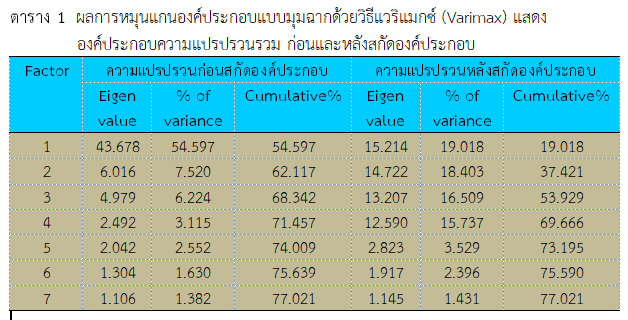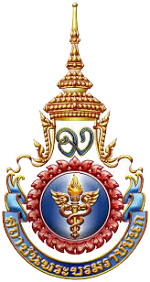การวิเคราะห์องค์ประกอบสมรรถนะของนักสาธารณสุขด้านการจัดการโรคระบาดในพื้นที่สามจังหวัดชายแดนภาคใต้ของประเทศไทย
คำสำคัญ:
นักสาธารณสุข, สมรรถนะ, โรคระบาด, การวิเคราะห์องค์ประกอบเชิงสำรวจบทคัดย่อ
การวิจัยเชิงสำรวจแบบภาคตัดขวางนี้มีวัตถุประสงค์เพื่อศึกษา 1) องค์ประกอบสมรรถนะของนักสาธารณสุขด้านการจัดการโรคระบาด 2) ตัวแปรที่อธิบายลักษณะองค์ประกอบสมรรถนะของนักสาธารณสุขด้านการจัดการโรคระบาด และ 3) ความต้องการในการพัฒนาศักยภาพนักสาธารณสุขด้านการจัดการโรคระบาดในพื้นที่สามจังหวัดชายแดนภาคใต้ของประเทศไทย ประชากร คือ บุคลากรสาธารณสุขที่ปฏิบัติงานด้านโรคระบาดโควิด-19 สังกัดกระทรวงสาธารณสุข พื้นที่สามจังหวัดชายแดนภาคใต้ จำนวน 1,282 คน กลุ่มตัวอย่าง 252 คน โดยการสุ่มแบบชั้นภูมิตามสัดส่วนของจังหวัด เครื่องมือที่ใช้ในการวิจัยเป็นแบบสอบถามออนไลน์มีค่าความเที่ยง 0.988 สถิติที่ใช้ คือ ค่าเฉลี่ย ส่วนเบี่ยงเบนมาตรฐาน และการวิเคราะห์องค์ประกอบเชิงสำรวจโดยวิธีองค์ประกอบหลักหมุนแกนแบบมุมฉากด้วยวิธีแวริแมกซ์
ผลการวิจัย พบว่า 1) องค์ประกอบสมรรถนะนักสาธารณสุขด้านการจัดการโรคระบาดมี 4 องค์ประกอบ ได้แก่ ด้านการจัดการข้อมูลด้านระบาดวิทยา ด้านการวางแผนและการประสานงาน ด้านธรรมาภิบาลและภาวะผู้นำ และด้านการบูรณาการองค์ความรู้ด้านสาธารณสุขเพื่อการดำเนินงานระบาดวิทยา (ค่าน้ำหนักองค์ประกอบ= 0.499 - 0.782, 0.611 - 0.769, 0.356 - 0.878 และ 0.370 - 0.737 ตามลำดับ) 2) มีตัวแปรทั้งหมด 80 ตัวแปร ตัวแปรที่มีค่าเฉลี่ยสูงสุดอยู่ในระดับมาก คือ เคารพและยึดมั่นในหลักจริยธรรมเกี่ยวกับการปกป้องข้อมูลและการรักษาความลับเกี่ยวกับสิ่งใด ๆ ข้อมูลที่ได้รับจากกิจกรรมทางวิชาชีพ ส่วนตัวแปรที่มีค่าเฉลี่ยน้อยที่สุดอยู่ในระดับปานกลาง คือ การคำนวณและตีความการประมาณการแบบจุดและช่วงความเชื่อมั่นของการวัดความสัมพันธ์และผลกระทบ และตัวแปรการคำนวณและตีความคำว่านัยสำคัญทางสถิติและนัยสำคัญทางคลินิก และ 3) ความต้องการพัฒนาอบรมระยะสั้นในหลักสูตรนักระบาดวิทยา การสอบสวนโรคและการเขียนรายงาน ในรูปแบบการฝึกปฏิบัติและมีข้อเสนอแนะให้มีการอบรมฟื้นฟูความรู้นักสาธารณสุขปีละ 1 - 2 ครั้ง ทั้งระบบออนไลน์และเผชิญหน้าและควรมีหลักสูตรนักสาธารณสุขผู้เชี่ยวชาญเฉพาะทาง
เอกสารอ้างอิง
Centers for Disease Control and Prevention. (2008). Competencies for applied epidemiologists in governmental public health agencies (AECs). Retrieved from https:// www.cdc.gov/appliedepicompetencies/downloads/AEC_Assessment_Tier1 .pdf.
Darathip, P., Yonchorho, N., & Suklapak, M. (2023). Competency of professional nurses in nursing people infected with coronavirus 2019, Bamrasnaradura Infectious Diseases Institute. Bamrasnaradura Infectious Diseases Institute Journal, 17(1), 25-36. (in Thai)
Department of Disease Control. (2011). Knowledge (Factsheet) on emerging infectious diseases. Nonthaburi: War Veterans Organization Under the Royal Patronage. (in Thai)
Department of Disease Control. (2020). Public health officials' guide to responding to emergencies. Case of the outbreak of coronavirus disease 2019 in Thailand. Retrieved from https://w2.med.cmu.ac.th/nd/wp-content/uploads/2020/03/COVID19_04032020.pdf (in Thai)
Department of Disease Control. (2022). Situation of covid-19 patients within the country. Retrieved from https://ddc.moph.go.th/covid19-dashboard/. (in Thai)
Department of Health. (2023). Summary of global statistics reporting on the COVID-19 situation around the world. Retrieved from https://covid19.anamai.moph.go.th/en/. (in Thai)
European Centre for Disease Prevention and Control. (2010). Core competencies for EU public health epidemiologists in communicable disease surveillance and response. Luxembourg: Publications Office of the European Union.
Hair, J., Blak, W. C., Barbin, B. J., Anderson, R. E., & Tatham, R. L. (2010). Multivariate data analysis. New Jersey: Upper Sandle River, Prentice Hall, p.168-707.
Health District Office 12. (2020). Lessons learned from COVID-19 Health District 12. Songkhla: Health District Office 12. (in Thai)
Health District Office 12. (2022). Report of public health personnel Health District 12. Songkhla: Health District Office 12. (in Thai)
Kaladee, E. (2016). Determination of sample size for factor analysis in health science research. Journal of Public Health Research Khon Kaen University, 9(2), 1-5.
Khiawyu, J. (2014). Statistical methods for measuring health. Khon Kaen: Department of biostatistics and demography faculty of public health Khon Kaen University. (in Thai)
McClelland, D. C. (1973). Testing for competence rather than intelligence. American psychologist, 28(1), 1-14.
Ministry of Public Health. (2020). Public health guidelines for managing the COVID-19 outbreak in accordance with section 9 of the emergency decree on public administration in emergency situations. 2005 (Edition 1st). Nonthaburi: TS Interprint Company Limited. (in Thai)
Pinyo, T. (2018). Techniques for interpreting factor analysis results for research. Panyapiwat Journal, 10 (Special Issue, July), 292-304.
Pooncharoen, W. (2006). Report on the evaluation of the project to develop a rapid mobile surveillance and investigation team. Nonthaburi: Department of Disease Control, Ministry of Public Health. (in Thai)
Sangkaew, S., Haniratisai, T., & Srisathitnarakul, B. (2020). Competencies of professional nurses in nursing patients with emerging infectious diseases. Nursing and Midwifery Council Journal, 35(3), 69-86.
Suphapwanich, C., Jirarattanasopa, P., & Kingsaiyut, B. (2022). Development of work competency of public health personnel from the perspective of administrators of health zones 1-12. Journal of Public Health and Health Sciences, 5(3), 138-153.
Tidthian, U. & Kitteerawutthawong, N. (2013). Assessment of competencies and training needs of basic epidemiology workers in District 17 public health areas. Nursing and Health Journal, 7(2), 88-99.
World Health Organization. (2021). Coronavirus disease (COVID-19) questions and answers (general). Retrieved from https://www.who.int/thailand/emergencies/novel-coronavirus-2019/q-a-on-covid-19/q-a-on-covid-19-general.

ดาวน์โหลด
เผยแพร่แล้ว
รูปแบบการอ้างอิง
ฉบับ
ประเภทบทความ
สัญญาอนุญาต
ลิขสิทธิ์ (c) 2023 วิทยาลัยพยาบาลบรมราชชนนี นครศรีธรรมราช

อนุญาตภายใต้เงื่อนไข Creative Commons Attribution-NonCommercial-NoDerivatives 4.0 International License.
บทความที่ได้รับการตีพิมพ์เป็นลิขสิทธิ์ของ วิทยาลัยพยาบาลบรมราชชนนี นครศรีธรรมราช
ข้อความที่ปรากฏในบทความแต่ละเรื่องในวารสารวิชาการเล่มนี้เป็นความคิดเห็นส่วนตัวของผู้เขียนแต่ละท่านไม่เกี่ยวข้องกับวิทยาลัยพยาบาลบรมราชชนนี นครศรีธรรมราช และบุคคลากรท่านอื่น ๆ ในวิทยาลัยฯ แต่อย่างใด ความรับผิดชอบองค์ประกอบทั้งหมดของบทความแต่ละเรื่องเป็นของผู้เขียนแต่ละท่าน หากมีความผิดพลาดใดๆ ผู้เขียนแต่ละท่านจะรับผิดชอบบทความของตนเองแต่ผู้เดียว





